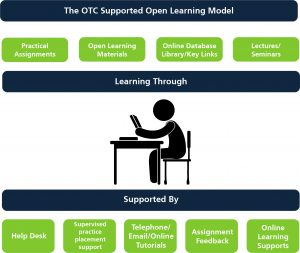QQI Cert in Patient Safety Complaints Advocacy – SP Level 7
- Next Course Commencement: Tuesday, February 10th, 2026.
- Starts with Online Introductory Session by Zoom (10am - 11.30am)
- Apply by Friday, January 30th, 2026 via the Online Application Centre
GENERAL INFORMATION
COURSE CODE
PG24073
LOCATION
Online/Dr Steevens Hospital
AWARD
Certificate in Patient Safety Complaints Advocacy
APPLY BY
30-01-2026
AWARD TYPE / LEVEL
START DATE
10-02-2026 - Online Introductory Session by Zoom (10am - 11.30am)
AUDIENCE
Those participating in the course may be employees of the Patient Advocacy Service, Advocates from independent Advocacy services or may be working as Patient Advocates within the HSE.
DURATION
CREDITS
20
FIRST WORKSHOP DATE / TIME
17-02-2026 / 9.30am - 4.00pm
WHY TAKE THIS COURSE
This course is intended for people who will be working as advocates for patients wishing to make complaints about the service they or a family member has received from state-funded health or social services. Those participating in the course may be employees of the Patient Advocacy Service, working as advocates from independent Advocacy services or may be working as Patient Advocates within the HSE.
Students will learn about the complaints process within the HSE and the role of advocates in supporting people wishing to make complaints. Students will also gain an in-depth knowledge of the Empowerment model of advocacy which will form the basis of the approach taken by the new service. The skills, principles and values needed to be an effective advocate will be explored and opportunities for students to develop these skills will be provided.



WHAT YOU WILL YOU LEARN
On successful completion of this course you will be able to:
- Demonstrate knowledge of human rights, patient advocacy, health and complaints systems
- Demonstrate an understanding of the underpinning principles of person-centredness, empowerment, ethics and a human rights approach
- Demonstrate cultural and racial awareness, awareness of issues of equality, ethics and communication principles for advocacy within the health services
- Work effectively as an individual and as a member of a team, demonstrating resilience and composure throughout the complaints process to full conclusion and resolution
- Engage in effective information searching, analysis and evaluation within the role underpinned by the principles of information management
- Express the role of the PSCA within the ecology of Irish health services, and act within professionally expected boundaries of competence and relevant codes of ethics.

COURSE CONTENT
The course aims to clarify the scope of patient complaints advocacy with patients in health services, detailing the limitations and benefits of the role to facilitate the service user/patient/family to specify and communicate their issues, concerns and wishes to the health service system. It seeks to provide the advocate with an ability to confidently engage in and successfully empower the service user/patient/family to self-advocate or to advocate on behalf of the service user/patient/family in the health services system and communicate outcomes effectively. It also aims to develop an ability to provide an advocacy service in complex cases.
The course consists of two modules:
Course Modules |
Unless otherwise stated, the workshop/webinars for the above modules will run from 9.30am to 4.00pm with comfort and lunch breaks.
Assessment |
The course is assessed through written assignments, online activities and discussions, reflection, case study reviews and skills demonstration. The skills demonstration and online activities are completed during the course, while the other assessment elements are submitted by the closing date.

ADDITIONAL COURSE INFORMATION
Supports Provided on the Patient Safety Complaints Advocacy course |
Each student will be allocated a tutor, who will provide telephone, email and online tutorial support throughout the programme's duration.

HOW THE PSCA COURSE WILL SUPPORT YOUR CAREER
The course is designed to give students the skills needed to be effective independent advocates for people who are in vulnerable situations and need help in navigating their way through what can be a challenging environment. These skills can be used by independent advocates in the new Patient Advocacy Service (PAS) or by people working in the health/social service sector.
It is hoped that by having patient advocates within health and social services, along with independent advocates external to these services, that this will help make services more responsive to the concerns and needs of people using the service and contribute to developing the learning and advocacy culture within these services.
Qualification
The course is a QQI HET Special Purpose Award at Level 7 on the National Framework of Qualifications.
Successful participants will be awarded a Certificate in Patient Safety Complaints Advocacy (20 ECTS credits).

COURSE ENTRY REQUIREMENTS
You are eligible to apply if you have:
- at least 3 years experience in a relevant area (nursing, clinical therapies, social care, social work, medicine, legal, psychology, psychotherapy, formal advocacy/complaints role).
- a keen interest in advocacy, empowerment, patient rights, complaints managing/processing and commitment to risk reduction strategies, quality outcomes and resolutions for patients.
- Strong interpersonal skills e.g. problem-solving; observational skills; empathic, resilient and positive; team-player; group skills (e.g. meetings).
- basic IT skills (word processing, excel) and access to a suitable device (desk-top, lap-top, tablet) and broadband Internet.
- robust written skills (e.g. report writing, using plain English) and an ability to interpret complex documents.
- English as your first language or hold CEFRL B2+ (=IELTS level 6) or equivalent
- Those aged between 18-23 must hold a minimum 60 ECTS Credits at HET Level 6 or above.
and if you are:
- willing to commit personal time (in addition to work time) in meeting the requirements of the programme of education.
- willing to participate in skills development, sharing and practice in simulated settings.
- willing to use/apply advocacy skills and knowledge in your current role following training.
International Applicants must provide appropriate documentary evidence of proficiency in English (i.e. IELTS 6.0).
NEXT STEPS
Dates
- We are accepting applications for the next online course to commence February 10th, 2026.
- The course commences with an Introductory Session (by Zoom) from 10.00am to 11.30am.
- Register your interest or enquire via our Online Application Centre.
- Enquiries to Claire Hopkins or Conor Murray by using the contact form below.
Duration
The course runs for 12 weeks.
How to Apply
Please read over all of the steps outlined below in order to submit a successful application:
Students are asked to apply to the course using our online application form and supporting documents. Upon receipt of all your details the College will review them with the purpose of inviting you to an upcoming interview which is a mandatory step for all applicants seeking a place on the course.
Please note: applicants and students will be contacted by email by the College. Please save the College’s email address(es) eg. info@opentrainingcollege.com or applications@opentrainingcollege.com, to your Contacts list and/or Safe Senders list. Please check your emails (including your Spam folder) regularly to ensure correspondence is not overlooked. Thank you!

Start Making your Application
All applications are processed through our application centre where you can:
- Submit your application
- Learn about what happens after you’ve made your application
- Monitor the progress of your application
To visit the Online Application Centre, click on the link below.
HOW CAN WE HELP?
Contact us if you want to know more about the course.
Call: (+353) 86 0756580 (Hours 9am-5pm please)
Mail: Please use the contact form below
